Silver City Blu-ray Movie
HomeSilver City Blu-ray Movie 
Olive Films | 1951 | 90 min | Not rated | May 29, 2012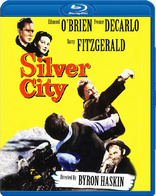
Movie rating
7 | / 10 |
Blu-ray rating
| Users | 0.0 | |
| Reviewer | 3.0 | |
| Overall | 3.0 |
Overview
Silver City (1951)
A mining expert helps a girl and her father dig for silver despite a landowner's henchmen.
Starring: Edmond O'Brien, Yvonne De Carlo, Richard Arlen, Barry Fitzgerald, Gladys GeorgeDirector: Byron Haskin
| Western | 100% |
Specifications
Video
Video codec: MPEG-4 AVC
Video resolution: 1080p
Aspect ratio: 1.34:1
Original aspect ratio: 1.37:1
Audio
English: DTS-HD Master Audio Mono
Subtitles
None
Discs
25GB Blu-ray Disc
Single disc (1 BD)
Playback
Region free
Review
Rating summary
| Movie | 3.0 | |
| Video | 3.5 | |
| Audio | 3.0 | |
| Extras | 0.0 | |
| Overall | 3.0 |
Silver City Blu-ray Movie Review
Assay can you see?
Reviewed by Jeffrey Kauffman May 25, 2012In 1971, Yvonne De Carlo entered the pantheon of Unforgettable Musical Theater Moments with her blistering reading of the classic Stephen Sondheim song “I’m Still Here” in the legendary musical Follies. De Carlo, playing “been there, done that” former Follies star Carlotta, sang about a life full of ups and downs, but one stanza of the song which De Carlo stated Sondheim wrote just for her seemed crafted by the master composer-lyricist most especially for the actress:
- Black sable one day, next day it goes into hock, but I’m here
Top billing Monday, Tuesday, you’re touring in stock, but I’m here
First you’re another sloe eyed vamp
Then someone’s mother, then you’re camp
Then you career from career to career
I’m almost through my memoirs, and I’m here!
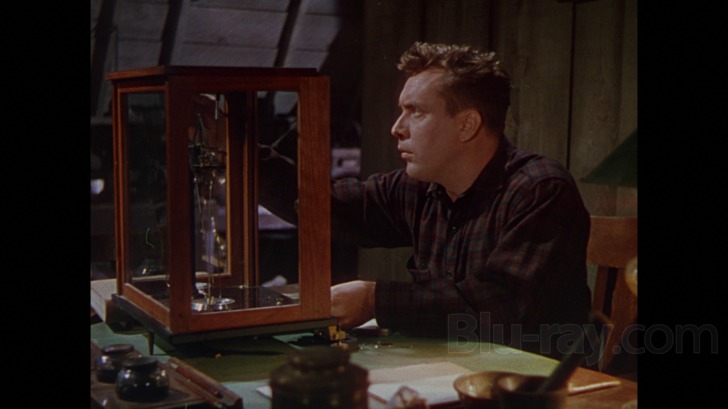
De Carlo was about ten years into her film career by the time she co-starred in Silver City in 1951, still young enough to exude an earthy sexuality, but too old to play a traditional ingénue role. Her Candace Surrency is a woman who knows her own mind (and heart) and isn’t afraid to state her opinion, rather forcefully at times. But she’s also a somewhat vulnerable character, one only too aware of the limitations being a female in the semi-wild west imposes on her. That includes her inability to effectively manage a mining operation that has uncovered a major hoard of silver, albeit in a mine that Candace’s father Dutch (Petticoat Junction’s Edgar Buchanan) has a lease on for only another twelve days (isn’t that always the way?). That brings Candace into needy contact with assay agent Larkin Moffatt (Edmond O’Brien), a man with a past (isn’t that always the way?) who nonetheless ultimately agrees to help Candace and Dutch extract as much silver as possible in the allotted time, despite the nefarious schemes to prevent them from doing so by the mine’s actual owner, Jarboe (Barry Fitzgerald).
I may be the only person living who would have ever noticed this similarity, but Silver City bears some uncanny resemblances to a 1940 Warner Brothers programmer called Flowing Gold, a sort of Boom Town knockoff which starred John Garfield, Frances Farmer and Pat O’Brien. Though that film dealt with oil well diggers, there are a number of remarkable similarities between the two films. First of all, each features a hero with a criminal past, trying to make good by helping a headstrong woman whose father has leased a mine (and/or well) which is under an impending timeline before mineral (and/or oil) rights lapse. Of course, Flowing Gold was a contemporarily based film and Silver City purports to be taking place in some unnamed frontier era (though there’s an anachronism or two, discussed below), but the basic plots of the two films are remarkably the same.
Silver City is a sort of middling to pretty good western that benefits from a host of interesting performances. Star Edmond O’Brien was never really a traditional romantic lead, and that fact hampers this film somewhat, a situation exacerbated by the fact that O’Brien really isn’t much of a traditional action star, either. O’Brien always excelled at crafting strong, often unforgettable, character portrayals (including his Oscar winning turn in 1954’s The Barefoot Contessa), but he simply doesn’t have the charisma necessary to really carry a film like this. He’s fine in the role, but there’s a certain void at the center of Silver City that not even a host of colorful supporting performances can completely fill. Those supporting performances include a kind of devilishly evil depiction by the usually lovable Barry Fitzgerald, who brings a smarmy charm to the character of Jarboe. There is also a fantastic mini-tour de force by the lovely Laura Elliot (later self-renamed Kasey Rogers and forever embedded in the minds of television viewers of a certain age as the wife of Larry Tate in Bewitched), who plays a onetime fiancée of Moffatt who is now married to Moffatt’s former partner (played by the always stalwart Richard Arlen).
The film is also (supposedly unintentionally) laugh out loud funny in a couple of key moments, something that doesn’t reflect especially well on its screenwriting or execution. After Moffatt’s assaying office is destroyed by Jarboe and his henchman, Moffatt returns the favor by breaking into Jarboe’s office and smashing everything to bits. It’s just kind of ludicrously humorous to see big, beefy O’Brien pulling little trinkets off the wall and smashing them willy nilly on the floor, and then almost falling over in the debris field he’s created. Several scenes have O’Brien (not to mention a quite obvious stunt double) seemingly instantaneously involved in fist fights for no good reason other than that the film needed a bit of action interpolated into it at any given moment.
Silver City does have two fantastic set pieces bookending the kind of drab interior part of the film. The opening sequence has Moffatt chasing after some would be thieves (with whom Moffatt is in cahoots), with all three of them ending up on a train that is chugging along over some treacherous territory. The film ends with a really distinctive tear through a logging mill, and it’s here that there seems to be some anachronistic elements. I’m no expert on logging history or machinery, but this completely automated, machine driven mill seems way out of place for the timeframe supposedly being portrayed. How did they manage to get all of these hydraulic arms, not to mention manifold saw blades, working without electricity? Was it all steam generated? It seems awfully strange. Putting that qualm aside, this sequence is really effective, as Moffatt and one of the bad guys hop on and off of logs that are being decimated by the machinery. This doesn’t appear to have been achieved via special effects and the results are adrenaline pumping, to say the least.
My wife, who watched Silver City with me (despite her general dislike for westerns), joked with me after the film was over, “I never knew the term ‘assay’ could be used so much in one film.” The emphasis on the technical ability to ferret out the worth of mineral or ore deposits may be one of the few innovative things about Silver City, but while the film never really rises above its fairly standard trappings, it’s colorful and strangely enjoyable. It was more than likely a programmer in its day, and it still plays as such. With appropriate expectations, it’s a decent enough time killer that may not be overly exciting, but has some nice performances and features De Carlo proving that she was there through (in the inimitable words of Stephen Sondheim) "good times and bum times”.
Silver City Blu-ray Movie, Video Quality 
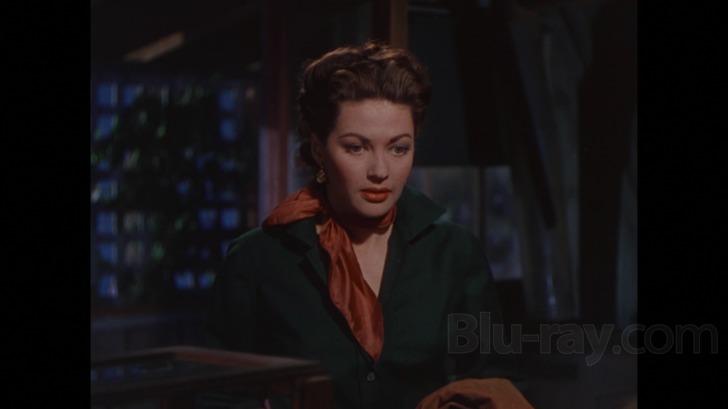
Silver City is presented on Blu-ray courtesy of Olive Films with an AVC encoded 1080p transfer in 1.34:1. This high definition transfer has definite pluses and minuses. Like virtually all of the HD masters provided to Olive by Paramount, there doesn't appear to have been an ounce of digital tweaking here, so "what was there is what you get", to kind of coin a new phrase. What that means with regard to Silver City is some absolutely lovely and still very vibrant color (Silver City was evidently filmed with three strip Technicolor), with little if any fading to report. Unfortunately what that also means is the elements here are in pretty shoddy shape, at least in what would have been the opening reel or two, with a huge amount of speckles and damage apparent (some of which is quite noticeable in the screencaps uploaded with this review). The tradeoff here is that the image is extremely film like, with natural grain and really robust color. Sharpness is above average, though there's a generally soft quality to many of the location outdoor shots.
Silver City Blu-ray Movie, Audio Quality 
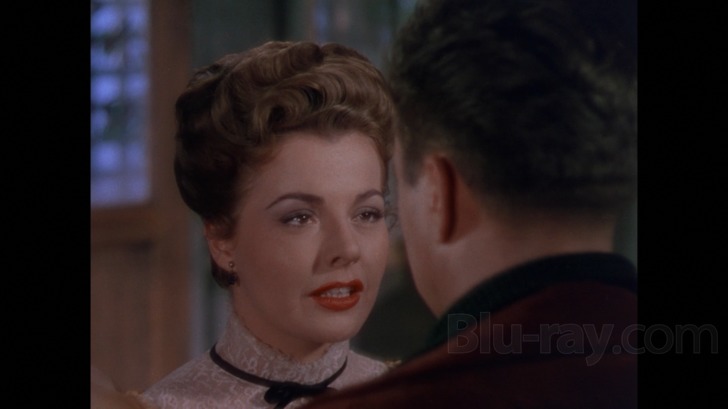
Silver City features a lossless DTS-HD Master Audio Mono mix which suffices perfectly well for the film, despite several sequences which might have benefited from a faux surround repurposing. Fidelity is quite good, especially in the midrange, but in fact all frequency ranges sound pretty decent here, with no discernable damage. The Paul Sawtell musical score also sounds just fine, and dialogue is cleanly and clearly presented. As with a lot of these older Paramount catalog titles, there's not a lot of "wow" factor to the soundtrack, but the lossless rendering presents a generally excellent mix in about as good a setting as might be hoped for.
Silver City Blu-ray Movie, Special Features and Extras 
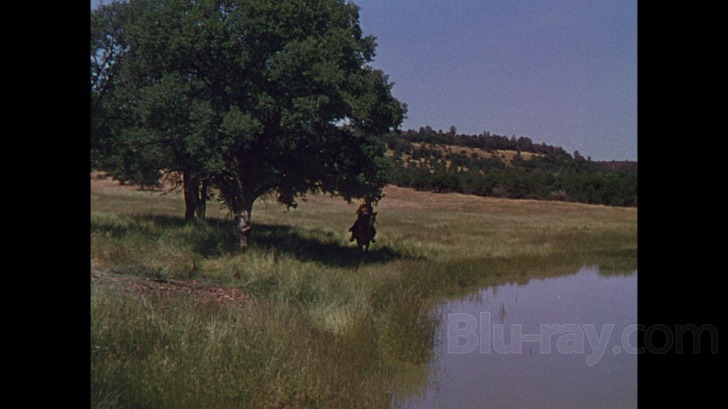
As is the usual Olive Films situation, there are no supplements of any kind on this Blu-ray.
Silver City Blu-ray Movie, Overall Score and Recommendation 
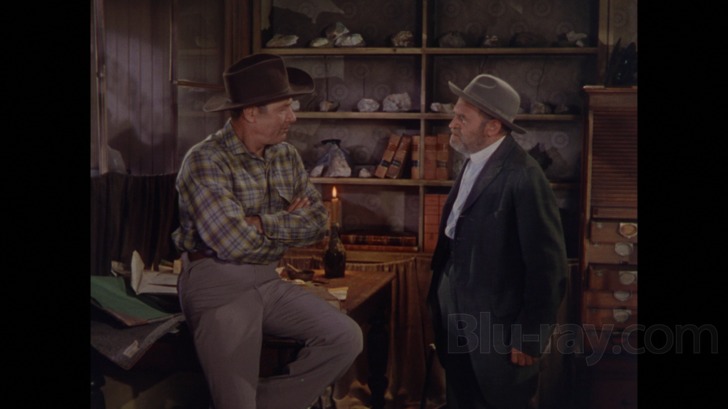
I was surprisingly engaged by Silver City. That said, make no mistake about it, this is not a great film by any stretch of the imagination. It's competent, extremely scenic and features good to excellent performances, but it's also rote and predictable. De Carlo is a very interesting screen presence, almost mannish at times here, and O'Brien is simply miscast as a putative western action hero. The real acting honors here go to Fitzgerald and especially Elliot (and/or Rogers, depending on which era you remember her from), both of whom are great. This Blu-ray's image has its ups and downs, but those with appropriate expectations will probably love the ravishing color cinematography. Despite its shortcomings, for western lovers if for no one else, Silver City comes Recommended.
Similar titles
Similar titles you might also like

Big Kill
2018

The Outsider
2019

The Ballad of Lefty Brown
2017

The Spikes Gang
1974

Captain Apache
1971

Tomahawk
1951

Barbarosa
1982

The Man from the Alamo
1953

Man with the Gun
1955

The Fastest Gun Alive
Warner Archive Collection
1956

Doc
1971

The White Buffalo
2K Restoration
1977

More Dead Than Alive
1969

The Last Hunt
1956

The Cimarron Kid
1952

No Name on the Bullet
1959

The Stalking Moon
Warner Archive Collection
1968

Monte Walsh
Special Edition
1970

Cheyenne: The Complete Series
Warner Archive Collection
1955-1962

Posse
50th Anniversary Edition
1975